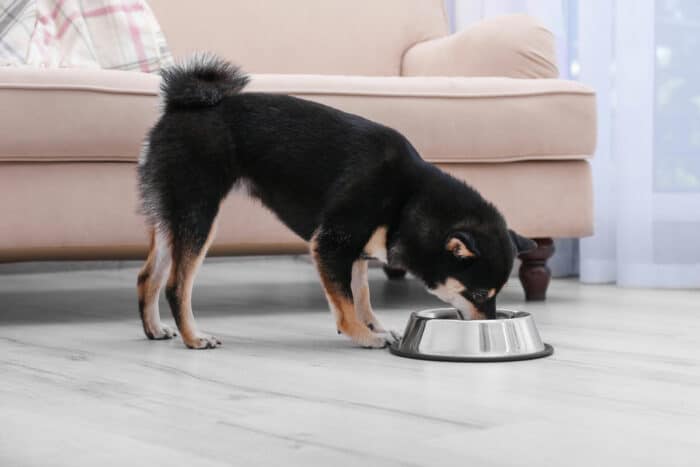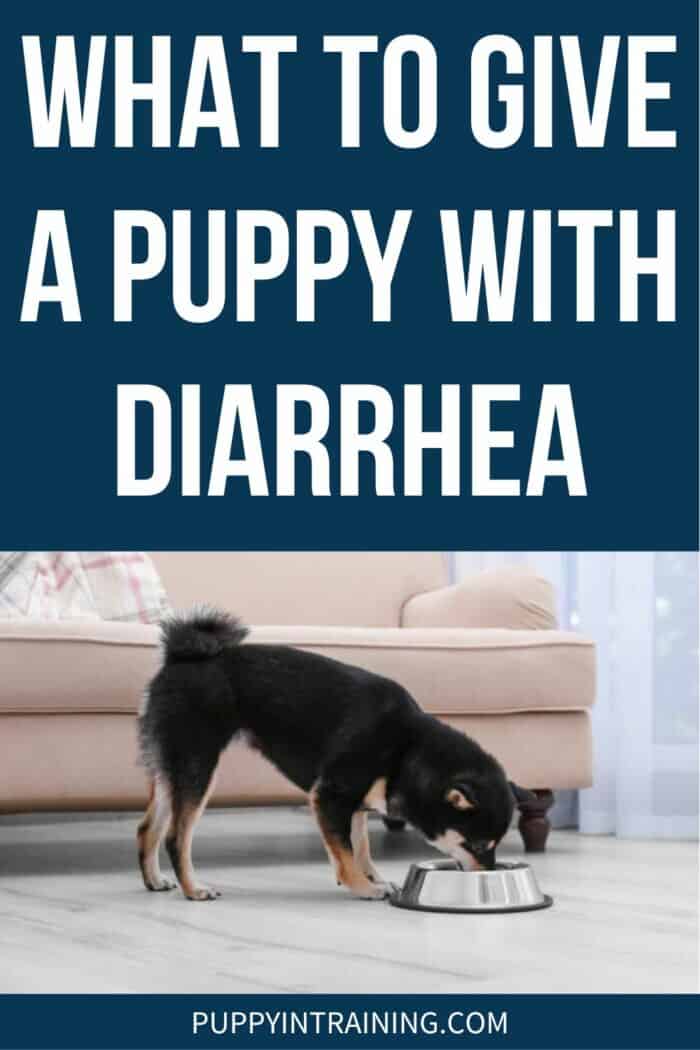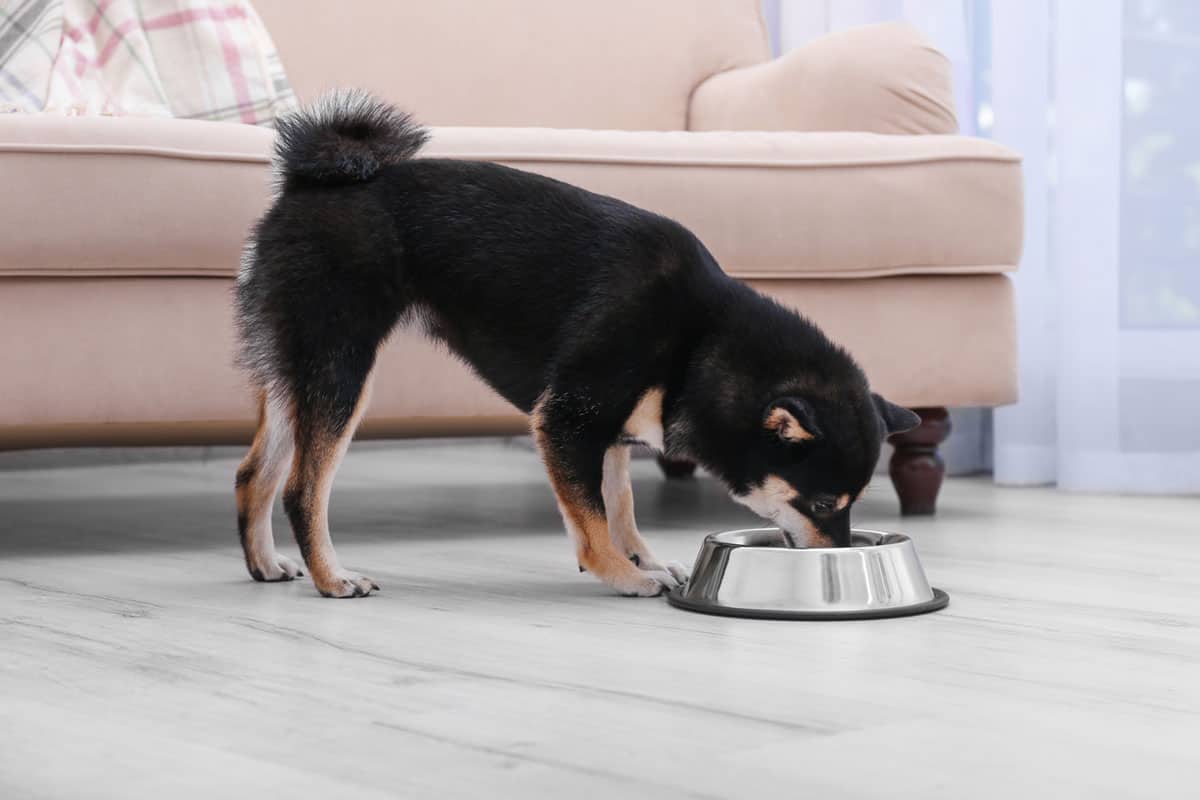This post may contain affiliate links. We may earn money or products from the companies mentioned in this post.
New puppy parents may be alarmed when their puppy suddenly gets diarrhea. Fortunately, mild diarrhea can be treated at home!
You can feed your puppy certain human foods to soothe their digestive tract and help them recover and return to normal.
To help prevent your puppy from getting diarrhea, there are certain steps you can take, such as crate training them while you are away, keeping up-to-date with their vaccines, maintaining a deworming schedule, and watching out for food allergies.
To help treat your puppy for diarrhea and prevent it in the future, you need to fully understand what diarrhea is and what causes it in puppies.

This article will help you understand how to best care for your puppy if and when they get diarrhea.
Keep reading to learn about what signs and symptoms to look out for to decide when it is time to take your puppy to the vet!
DISCLAIMER: This information is for entertainment purposes only. If you’re dog/puppy is having any kind of health issue including diarrhea please contact your veterinarian.
What Is Diarrhea?
Diarrhea occurs when the body is not retaining any fluids. These are fluids both from what is being drunk and from what is being eaten.
This means that even though your dog may appear to be drinking a lot of water and they may be eating wet food, if they have diarrhea they will, in fact, be losing fluids.
If your puppy is not retaining any fluid, they will quickly become dehydrated. Dehydration is a leading cause of death in puppies. Without enough fluid in the body, their organs will start to shut down, and they will eventually die if left untreated.
What Causes Diarrhea In Puppies?
There are six main causes of diarrhea in puppies. Puppies get diarrhea when they are stressed, have infections, have high parasite loads, ingest foreign objects such as human food or garbage, react to new foods or treats, or have a very quick change in their food.
1. Stress
Stress is a main contributing factor to puppies with diarrhea.
When a puppy gets very stressed, their body does not process what is in the digestive tract properly, and they instinctively enter a fight or flight mode.
When this happens, the dog’s body will try to get rid of what is in the digestive tract as quickly as possible so the puppy can run away or attack without the added worry of a full belly.
Unfortunately, a lot of the world is very scary to a tiny puppy. Loud noises, such as the TV or small children, can cause your puppy to become very stressed and therefore have diarrhea.
Stress and anxiety affect the digestive tract in puppies, especially when there are big changes.
One of the biggest changes they will experience is leaving their mother and littermates. This means you may take home a puppy that will have diarrhea until it fully settles down.
PRO TIP: The best way to solve the problem of stress diarrhea is to get your puppy used to a routine and stick to that routine. The routine will help them relax and feel less stressed in their new home.
2. Infection
Another leading cause of diarrhea in puppies is infection. Puppies can be infected with bacteria or viruses more easily than adult dogs because they are not fully vaccinated and do not have a strengthened immune system.
Where adult dogs may be able to fight off a viral or bacterial infection before you even realize they are sick, puppies will get very sick very quickly, with a common symptom being diarrhea.
Common bacterial infections in puppies are from salmonella, e. coli, and Clostridium. Common viral infections include the parvovirus, the distemper virus, and the common puppy cold.
Diarrhea that results from bacterial and viral infections can often prove fatal in puppies because their systems are not yet strong enough to fight off infections. This means your puppy could dehydrate to the point of death because they have diarrhea.
It is vital that you get your puppies vaccinated as soon as they are old enough and stick to their yearly vaccine schedule.
3. Parasites
If you own pets, you know parasites are par for the course. Puppies will often be born with different parasites if their mother had a high parasite load. Parasites can also be picked up very easily in the puppies’ environment.
Common parasites include roundworms, hookworms, coccidia, giardia, and whipworms. All of these parasites can be found in infected fecal matter, in unsanitary living environments, and from other animals.
It is important to only take your puppy out in public around other dogs and animals once they have started their deworming schedule and they have built up a strong immune system.
PRO TIP: Our rescue puppy, Linus came home with most of the aforementioned parasites also add ear mites to the list. One of the first things you’ll want to do with your new puppy is a vet check up to make sure your puppy is happy and healthy.
4. Ingesting A Foreign Object
If your puppy has ingested a foreign object such as a toy, plastic, food from the garbage, or other things they have found lying around the house like poisonous plants, this will often lead to diarrhea.
This is either because there are toxins in what they have eaten or their body is trying to get rid of the object. However, the body can go in the opposite direction and become severely constipated.
It is advisable to remove any foreign objects or things your puppy could chew on and get sick from away from anywhere the puppy may manage to access them.
If you cannot do this, then crate training your puppy for when you are away from them and they are unsupervised is preferable.
5. Allergic Reaction
If you’ve changed the food your puppy is eating or offered them treats and noticed they get sick almost immediately afterward with vomiting and diarrhea, you can almost be certain that your puppy is allergic to this new food.
If you feel this is the reason for your puppy’s diarrhea, offer them the food in a week’s time and see if they have a similar reaction.
If they have the same reaction, then you can be certain that they are allergic to it. If they do not have the same reaction, then something else was the cause of the diarrhea.
6. Food Change
Changing a puppy’s food can also lead to diarrhea if it is done too quickly.
If you are introducing new food to your puppy, whether it is a new brand of food or a different flavor of the same food, it needs to be done gradually to avoid a reaction that will result in diarrhea.
Sometimes, your puppy’s digestive system is just a little bit too sensitive for its own good. It needs a slow transition of between 7 to 10 days from the old to the new food to avoid diarrhea.
PRO TIP: When we first bring home a puppy we always keep them on the same food they were on with their previous owners/breeders/rescue. Staying on the same food at least eliminates a food change as the possible culprit for liquid poop.
What Can You Feed Your Puppy To Treat Diarrhea?
If you notice your puppy gets diarrhea, there are certain foods that you can feed them that will help treat their diarrhea. Fortunately, many of these foods can be found in your own kitchen!
Take care when you prepare them for your dog to not contaminate them with any human food that may worsen the diarrhea like spices and salt.
When offering your puppy any food to treat its diarrhea, start very small. If you have a small to medium breed of dog, start with 1 tablespoon of food once every two hours.
If you have a large or giant breed of dog, start with 2 tablespoons of food once every two hours.
White Rice
Plain-cooked white rice is very gentle on the digestive tract. When preparing the rice, rinse it well to remove any excess starch, cook it according to the instructions, and always make sure you serve it at room temperature.
White rice will provide your puppy with the calories it needs that it has lost due to diarrhea.
Do not give your puppy brown rice or instant rice, as they are too high in complex carbohydrates that may irritate the digestive tract.
Lean Protein
Your puppy is still growing rapidly, and it, therefore, needs protein. Low-fat protein such as chicken breasts, turkey, or lean hamburger meat will all be very gentle on your puppy’s digestive tract.
This means even though your dog has suffered from diarrhea, it will not impact their growth rate, as they are still getting protein.
To prepare that lean protein for your puppy, chop it into very small bits or shred it. The protein should be boiled until it is fully cooked and must not be seasoned or cooked with oil or butter, as this will irritate your dog’s digestive tract and make them even sicker.
TIP: In the past our vet has recommended white rice with boiled chicken to help our puppies upset tummies.
Potatoes
Your puppy will need starch or fiber in their diet to help them regulate their digestive tract. White and sweet potatoes are both excellent options to offer your puppy. The starch contained in potatoes is easily digestible once they have been fully cooked.
To prepare the potatoes, cut them up into small pieces that are the same size as your puppy’s kibble, and boil them until they are thoroughly cooked.
Do not cook the potatoes in butter, or oil, or season them in any way, as this will harm your puppy by potentially upsetting their stomach even further.
Canned Pumpkin
Offering puppies with diarrhea canned pumpkin is one of the tried-and-tested methods professional dog owners and breeders use. I always recommend having a can of plain pumpkin at home when you have puppies!
Plain canned pumpkin is high in fiber but still gentle on the digestive tract.
When preparing the canned pumpkin, you do not need to heat it or chill it; just make sure it is fresh out of the can and the can has not been open for more than four days.
Before offering the canned pumpkin to your puppy, triple-check that it is plain canned pumpkin from the vegetable aisle of your grocery store and not pumpkin pie filling.
TIP: We’ve used canned pumpkin from the grocery store. If you’re worried about getting the wrong canned pumpkin you can also try Weruva Pumpkin Pouches you can buy from the pet store. The only problem with Weruva pumpkin is it’s much more expensive.
Prescription Food
If your puppy suffers from gastrointestinal issues, they may need a prescription puppy food. You will only be able to get the specifically prescribed food for your puppy from your vet.
However, there are also some dog foods that are offered, for example by Hills and Purina, which are easier on the digestive system. These can be worth trying to determine if your puppy benefits from a gentler, milder food formulation.
FAQs About Puppies With Diarrhea…
What can I give my puppy to prevent diarrhea?
Include prebiotics and probiotics in your puppy’s diet. These will help protect the digestive tract and prevent diarrhea in the future
When you are giving your puppy new foods, be careful not to transition them too quickly. Follow these steps:
- On day 1, switch out a quarter of the old food with the new food
- On day 3, switch out half of the old food with the food
- On day 5, switch out three-quarters of the old food with the new food
- On day 7, switch out all of the old food with the new food
We gave our Golden Retriever, Raven probiotics when her tummy was bothering her after having a litter of puppies. The probiotics seemed to help a little but I think the best remedy for her was getting her to stop cleaning (eating) the puppy poop.
What can I do for my puppy to avoid diarrhea?
There are several things you can do in terms of behavior and scheduling to prevent your puppy from getting diarrhea at all.
- Do not feed your puppy from the table, as human food contains spices, fats, and toxins that will cause diarrhea.
- Crate train your puppy so they are not left at home unsupervised with access to things like plants, the garbage, and other things that may include toxins that will cause diarrhea.
- Stay up-to-date with your puppy’s vaccinations to give them the best fighting chance against bacterial and viral infections.
- Stick to a strict deworming schedule to reduce the parasite load in your puppy’s gut and prevent them from picking up parasites in the future.
When should you be worried and consult a vet?
If diarrhea continues for more than two days straight, contact your vet. You actually might consider bringing your puppy in earlier depending on the situation. Ask them what you should do whether they need to see your puppy or not.
If you notice blood in your puppy’s diarrhea, take them to the vet immediately.
Finally, if your puppy loses consciousness or cannot stand up on its own, take them to the vet immediately.
Rolling Over On Helping Puppies With Diarrhea…
It is important to know what to give a puppy with diarrhea. Puppies suffer from diarrhea fairly regularly because they are exposed to a lot of new things, such as:
- New environments which are stressful
- New kinds of food
- Bacterial and viral infections
- Parasites
To recap what to give your puppy if they have diarrhea, you can offer them one to two tablespoons of cooked white rice, boiled lean protein, cooked white or sweet potatoes, and plain canned pumpkin.
Save To Pinterest

Top Picks For Our Puppies
- BEST PUPPY TOY
We Like: Calmeroos Puppy Toy w/ Heartbeat and Heat Packs – Perfect for new puppies. Helps ease anxiety in their new home. - BEST DOG CHEW
We Like: Bones & Chews Bully Sticks – All of our puppies love to bite, nip, and chew. We love using Bully Sticks to help divert these unwanted behaviors. - BEST DOG TREATS
We Like: Crazy Dog Train-Me Treats – We use these as our high-value treats for our guide dog puppies. - BEST FRESH DOG FOOD
We Like: The Farmer’s Dog – A couple months ago we started feeding Raven fresh dog food and she loves it! Get 50% off your first order of The Farmer’s Dog.
Check out more of our favorites on our New Puppy Checklist.
